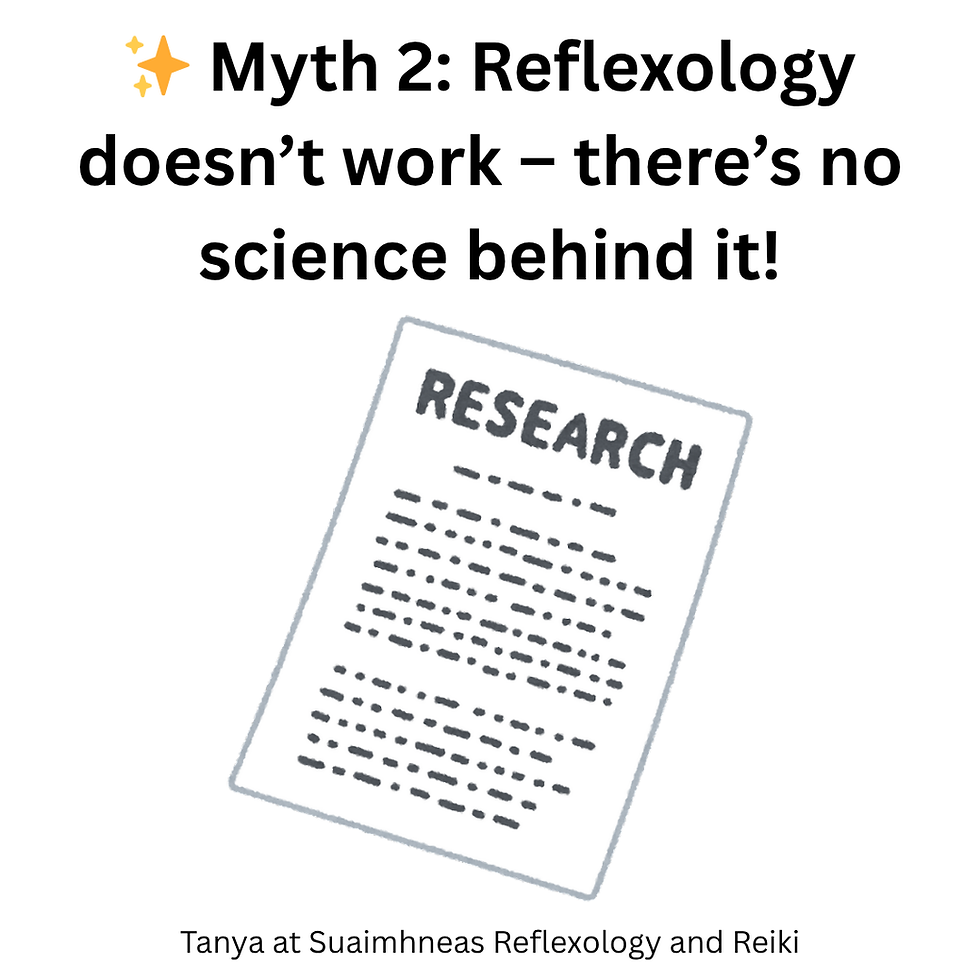✨ Myth 13: Anyone Can Do Reflexology After Watching a Video
- Tanya

- Sep 10, 2025
- 3 min read
❌ The Myth
“Reflexology is just a foot rub – anyone can do it after watching a video online.”
✅ The Reality
Yes, you’ll find reflexology tips on YouTube and Instagram, but true therapeutic reflexology is far more than copying techniques or pressing random points on the feet.
Professional reflexologists study:
Anatomy and physiology
Contraindications and safe practice
Tailored approaches for different needs
Ethics, boundaries, and professional care
When you choose a qualified, insured practitioner, your treatment is not only safe but also adapted specifically for you.
🌿 Why Professional Standards Matter
It’s important to know that anyone can claim to be a reflexologist online – even after a few hours of training. But that doesn’t mean they are safe to practise.
That’s why professional registration is key. For example, I’m registered with the Complementary and Natural Healthcare Council (CNHC), which is the UK’s independent voluntary regulator for complementary healthcare practitioners.
Did you know?
Doctors can refer patients to CNHC-registered practitioners. The General Medical Council (GMC) guidance clearly states that doctors may refer patients to practitioners who are on Accredited Registers.
🌿 About the Accredited Registers Programme
The Accredited Registers Programme is run by the Professional Standards Authority for Health and Social Care (PSA) – the same body that oversees the General Medical Council (GMC), The Nursing and Midwifery Council (NMC) and The Health and Care Professions Council (HCPC).
It ensures that practitioners who aren’t legally regulated (like reflexologists) are still held to robust professional standards. CNHC has been accredited by the PSA since 2013.
This means:
CNHC practitioners meet National Occupational Standards
They follow a rigorous Code of Conduct
They hold professional indemnity insurance
They are recognised as part of the wider healthcare workforce under UK law
So when you see the CNHC quality mark, you can “Choose with Confidence.”
🌿 Complementary Therapies in Context
Complementary therapies like reflexology are used alongside conventional medicine. They’re not about replacing medical care, but about supporting health and wellbeing goals.
A joint report from the Royal Society for Public Health and the Professional Standards Authority (Untapped Resources: Accredited Registers in the Wider Workforce) highlighted how practitioners on Accredited Registers support public health every day.
This includes:
Helping people reduce stress and manage pain
Supporting better sleep and emotional balance
Encouraging healthier diet and lifestyle choices
Assisting with smoking cessation and weight management
In other words, reflexology – when practised professionally – is part of a bigger picture of improving health and wellbeing, not just for individuals but for communities.
🌿 The Wider Debate
The Daily Mail recently reported on MPs suggesting that GPs should prescribe therapies like reflexology, Reiki, and massage.
While some dismiss these therapies as “fluffy” or “non-essential,” the All-Party Parliamentary Group (APPG) argued that the perception of complementary therapies needs to shift to recognising them as crucial.
And while research evidence is still developing, we know one thing for certain:
Just as conventional medicine often requires trial and error to find the right treatment, so too with complementary therapies – what works brilliantly for one person might not for another.
The fact that therapies like reflexology are now recognised within Accredited Registers is proof of their growing integration into mainstream wellbeing support.
🌿 In Summary
Reflexology isn’t something anyone can do after watching a video. It’s a skilled therapy that requires professional training, safe practice, and ongoing development.
By choosing a reflexologist registered with CNHC, you’re choosing:
A therapist who meets national standards
Someone committed to professionalism and safety
A practitioner recognised as part of the UK’s wider healthcare workforce
👉 To find a CNHC registered complementary therapist near you, visit the official CNHC Accredited Register.
Tanya x




